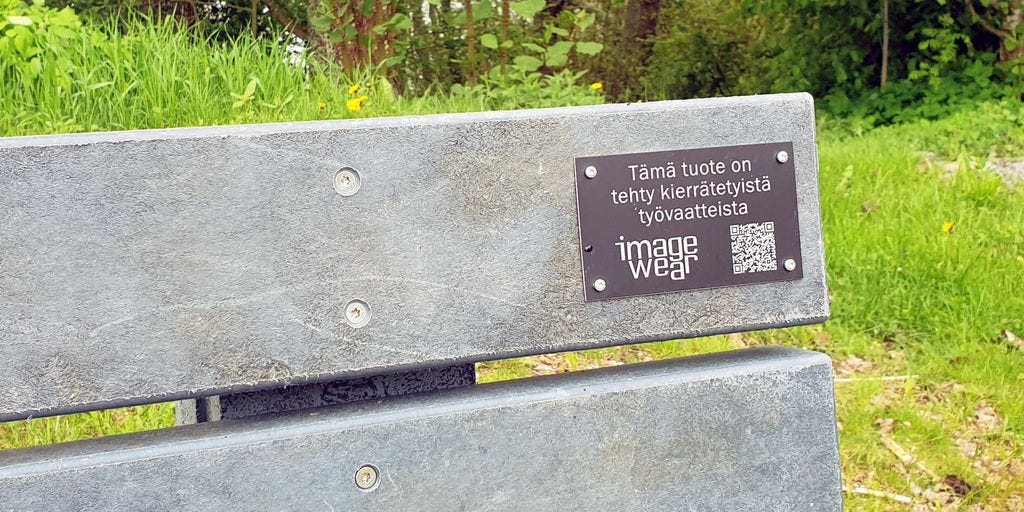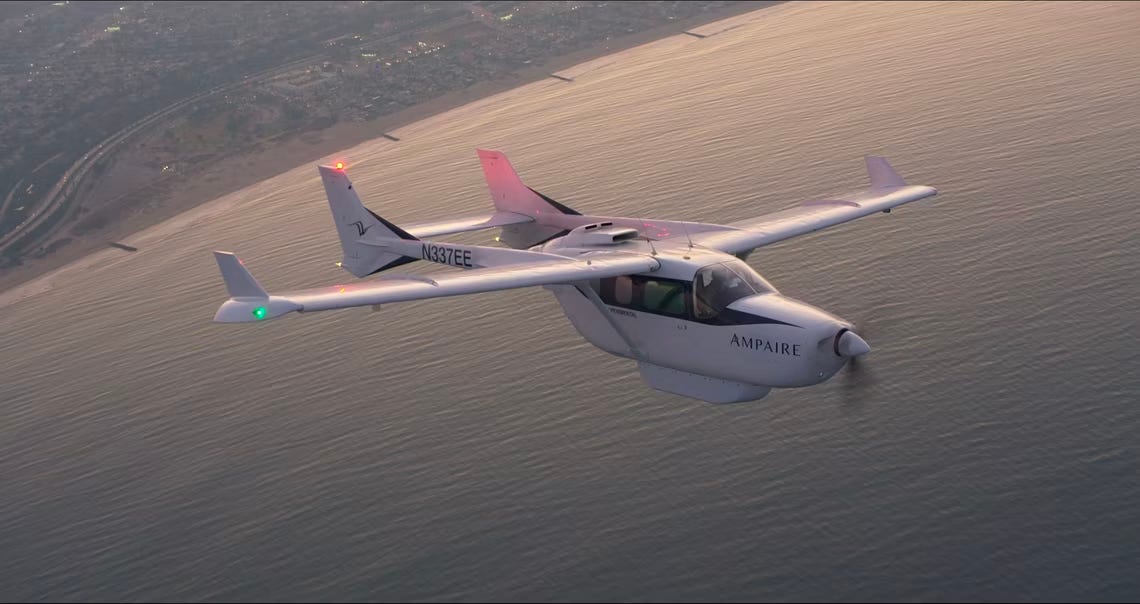#Sustainability20: Retrofitted Hybrid-Electric Cessna To Make Historic Flight To Alaska & Other Stories In Aviation
Weekly Roundup - 04/08/23
Each Friday, we publish a round-up of the 20 most important stories on sustainable aviation. You can see previous editions of #Sustainability20 here.
Industry Updates
The Biden administration announced a $100 million grant program to subsidise carbon recycling purchases by state, local governments, and public utilities. Carbon recycler Twelve, which uses waste materials to make products, including sustainable aviation fuel, will benefit from the funding. The Energy Department initiative aims to stimulate demand for carbon recycling technologies, reduce greenhouse gas emissions, and build a circular economy.
Momentum Ventures, the parent company to FlightHub and Justfly, has endorsed the Canadian government's Initiative for Sustainable Aviation Technology (INSAT), which has received $350 million investment from the Strategic Innovation Fund. The INSAT will focus on areas like alternative propulsion systems, advanced aircraft designs, and greener fuels to encourage sustainability in the aviation sector. Momentum Ventures is actively engaged in eco-friendly initiatives and supports the greener aviation transition.
JetBlue Ventures has joined an $80 million funding round for carbon capture startup Avnos, which develops a system that captures CO2 and water from the atmosphere simultaneously. The tech could be used in e-fuel production and is more energy-efficient than similar systems. JetBlue also joined the expanded United Airlines Ventures Sustainable Flight Fund, now valued at $200 million, which aims to scale the sustainable aviation fuel industry.
Heathrow Airport has asked airlines to carry as much fuel as possible due to supply issues, a practice known as "fuel tankering" that increases carbon emissions. Despite the additional carbon footprint and costs, fuel tankering can be financially beneficial for airlines if fuel is cheaper at one airport. The airport insists there's no impact on passengers or flights and didn't comment on the cause of the supply issue.
The Civil Aviation Authority of Singapore (CAAS) and the Japan Civil Aviation Bureau (JCAB) plan to make air travel between their countries greener, restoring more city links, and promoting sustainable aviation. The agencies will implement green air traffic management for flights between Singapore and Tokyo, cutting emissions and reducing flight times. They also aim to increase the use of sustainable aviation fuel.
CLIMATE WATCH: Florida’s Record-Breaking Sea Temperatures Are Forcing Coral to Move Ashore - The New York Times
Climate change has decimated the coral reefs off the Florida Keys, with record-breaking sea temperatures causing widespread coral death. Experts are racing to preserve remaining corals on land, but the escalating frequency and severity of marine heat waves, worsened by global warming, casts doubt on the feasibility of restoring reefs in increasingly inhospitable ocean conditions. Conservationists urge immediate, substantial climate action to protect these critical marine ecosystems.
Infrastructure and operational efficiencies
All Nippon Airways (ANA) will offset part of its greenhouse emissions through a carbon credit system underpinned by Direct Air Capture (DAC) technology. The airline signed a contract to purchase 30,000 tonnes of carbon credits from 1PointFive, a US subsidiary of Occidental Petroleum, making it the first airline to utilise DAC technology. ANA's decarbonisation strategy comprises 10% carbon dioxide removal, 70% sustainable aviation fuel use, and 20% operational improvements.
Finnair is recycling and upcycling old uniforms into garden furniture via a partnership with Finnish work-clothing manufacturer Image Wear. Good condition uniforms are reused, while worn-out items are combined with recycled plastic to create durable composite materials for outdoor items, furthering Finnair's sustainability efforts.
Manchester Airport Group (MAG) is launching an education programme, the Jet Zero Education, to teach young people about sustainable aviation fuels and decarbonisation of aviation. The programme, supporting MAG's commitment to net zero operations by 2038, will be delivered at on-site Aerozones at three airports, focusing on the aviation industry's net-zero target for 2050.
See also: Stansted Airport launches sustainable flight course for young people - AviationSourcePros
Sustainable Aviation Fuel (SAF)
Lufthansa Group and HCS Group have signed a letter of intent to collaborate on the production and supply of SAF using alcohol-to-jet technology from 2026. The SAF, made from biogenic residues, will support Lufthansa's sustainability strategy and market ramp-up of SAF.
Waste-to-energy firm Uniwastec is partnering with Lyte Aviation to develop hydrogen fuel from wastewater for aviation. Uniwastec's energy-efficient process will supply net zero carbon fuel for Lyte's hybrid-electric aircraft. Lyte's aircraft, SkyBus and SkyTruck, target service entry in 2030 with plans for all-hydrogen propulsion.
Geoff Cooper, president of the Renewable Fuels Association, criticises US regulations favouring electric vehicles (EVs) over ethanol. Cooper argues that the classification of EVs as "zero emissions" ignores upstream emissions from electricity generation and battery mineral processing. He also warns of increased dependency on adversarial nations for rare minerals. Additionally, Cooper criticises the sustainable aviation fuel tax credit, as corn ethanol-based fuel doesn't qualify under the chosen emissions model.
Calumet has become North America's largest producer of SAF, using Topsoe’s HydroFlex technology at its Great Falls refinery in Montana. The facility produces around 15,000 barrels of SAF and renewable diesel daily, catering to the increasing demand for cleaner fuels.
New technology: Electric and Hydrogen
Air New Zealand (AIR NZ) is seeking expressions of interest from regional airports to accommodate its next-generation, low-emissions aircraft from 2026. The new aircraft, part of AIR NZ's decarbonisation strategy, will initially be used for cargo, with plans to expand into passenger aviation. The move precedes the carrier's goal to replace its Q300 fleet with sustainable aircraft from 2030.
Ampaire, Inc., a California-based electric air travel technology company, is set to introduce its converted hybrid-electric aircraft, the Electric EEL, to Alaska via Launch Alaska, the state's first climate tech deployment accelerator. The Electric EEL, a modified Cessna 337, has previously made record-breaking non-stop flights and is the first of its kind to fly from Southern California to Alaska.
Ampaire focuses on retrofitting small regional aircraft with hybrid-electric technology to improve efficiency and reduce carbon emissions. The company, which has already performed successful test flights and received orders, believes this cost-effective and practical solution can be implemented quicker than developing new aircraft, requiring no charging infrastructure and allowing low carbon air connectivity to small communities. The retrofitted aircraft are anticipated to enter service by 2024.
Airbus is advancing its EcoPulse hybrid-propulsion program, which uses distributed propulsion to improve aircraft performance. This initiative involves breaking down thrust generation among many small engines distributed along the aircraft's span, which could lead to better cruise, improved takeoff and landing, and reduced cabin noise. Airbus is working with Daher and Safran on the demonstrator, a modified Daher-Socata TBM 900 turboprop, and is set to conduct flight tests later this year.
Hamburg Airport is set to become a hydrogen hub in the general aviation sector through the EU-backed "Baltic Sea Region Project." The initiative aims to connect rural Baltic Sea regions with aviation hubs using hydrogen-powered small aircraft. The project, due to start in November 2023, involves 16 project partners and 24 associated organisations and carries a budget of up to 4.8 million euros.
GE Aerospace and magniX have unveiled the designs for their hybrid electric aircraft for NASA's Electrified Powertrain Flight Demonstration (EPFD) project. The EPFD project aims to accelerate the adoption of hybrid propulsion systems in commercial aircraft. NASA plans two flight demonstrations within the next five years to introduce these systems to the US fleet between 2030-2035.
Opener, a light eVTOL developer, has launched an Early Access Program for its BlackFly aircraft. A dozen customers will experience Opener's training and aerial technology first hand and provide feedback. The first customer has already received their eVTOL, and the program is part of the company's strategy towards general market release.
Japanese eVTOL manufacturer SkyDrive and Vietnamese CT UAV have signed an MOU for a pre-order of up to 100 SkyDrive eVTOL aircraft. They will evaluate commercial eVTOL aspects like vertiports, routes, and infrastructure in Vietnam, aiming to alleviate traffic congestion.





